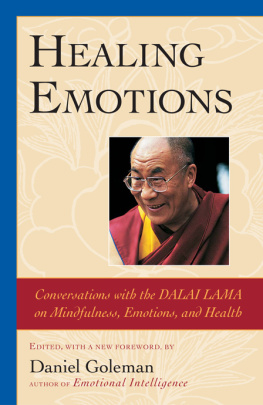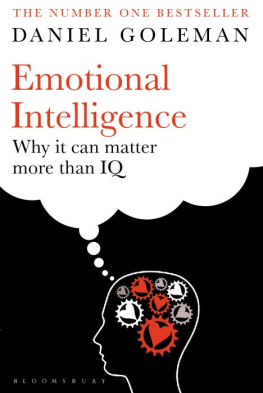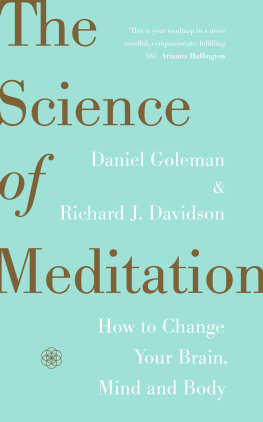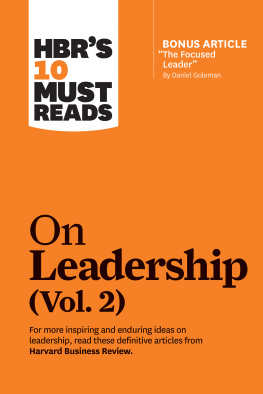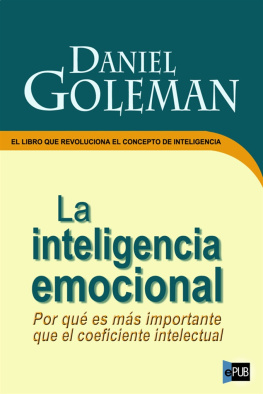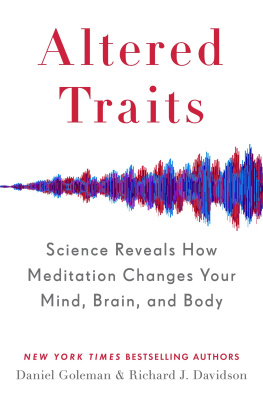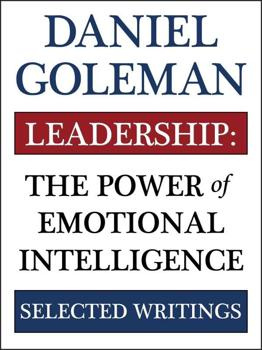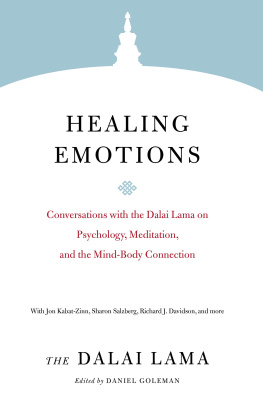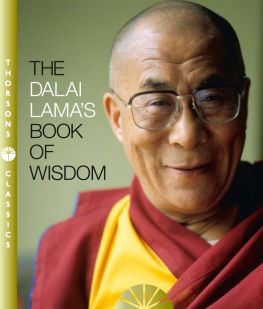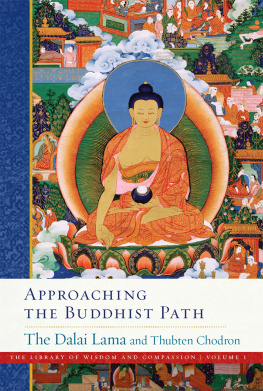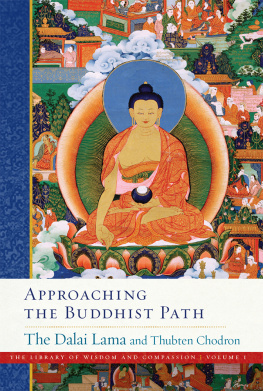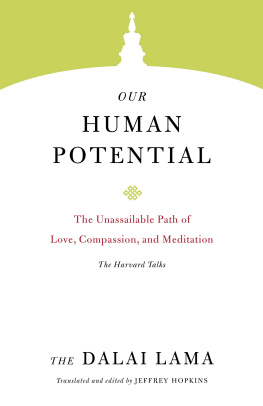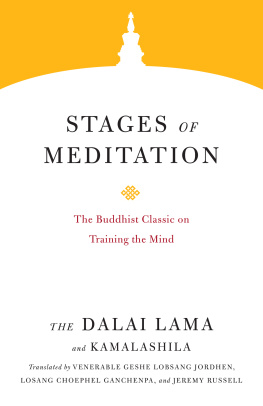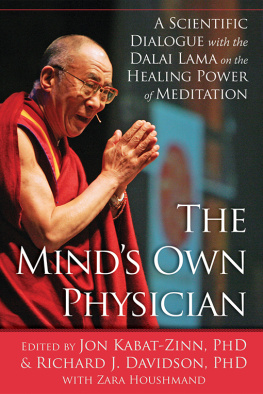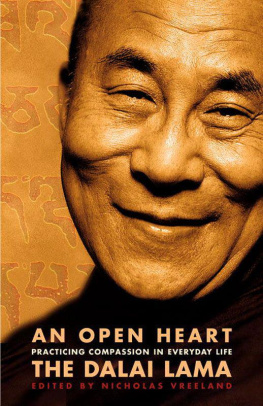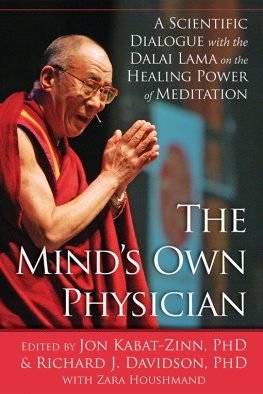ABOUT THE BOOK
Can the mind heal the body? The Buddhist tradition says yesand now many Western scientists are beginning to agree. Healing Emotions is the record of an extraordinary series of encounters between the Dalai Lama and prominent Western psychologists, physicians, and meditation teachers that sheds new light on the mind-body connection. Topics include: compassion as medicine; the nature of consciousness; self-esteem; and the meeting points of mind, body, and spirit.
This edition contains a new foreword by the editor.
DANIEL GOLEMAN, Ph.D., has twice been nominated for the Pulitzer Prize. He is the author of numerous books, including Emotional Intelligence, Working with Emotional Intelligence,The Meditative Mind, and Primal Leadership: Realizing the Power of Emotional Intelligence.
Sign up to learn more about our books and receive special offers from Shambhala Publications.

Or visit us online to sign up at shambhala.com/eshambhala.

Conversations with the Dalai Lama on Mindfulness, Emotions, and Health

EDITED, WITH A NEW FOREWORD, BY
DANIEL GOLEMAN, PH.D.

SHAMBHALA
Boston & London
2012
SHAMBHALA PUBLICATIONS, INC.
Horticultural Hall
300 Massachusetts Avenue
Boston, MA 02115
www.shambhala.com
1997 by the Mind and Life Institute
Cover art: Portrait of the Dalai Lama by Alison Wright
All rights reserved. No part of this book may be reproduced in any form or by any means, electronic or mechanical, including photocopying, recording, or by any information storage and retrieval system, without permission in writing from the publisher.
Library of Congress Cataloging-in-Publication Data
Healing emotions: conversations with the Dalai Lama on mindfulness, emotions, and health/edited by Daniel Goleman.1st ed.
p. cm.
Includes index.
eISBN 978-0-8348-2424-9
ISBN 978-1-57062-212-0 (pbk.: alk. paper)
ISBN 978-1-59030-010-7 (pbk.)
1. HealthReligious aspectsBuddhism. 2. BuddhismPsychology. 3. Buddhist ethics.
I. Goleman, Daniel.
BQ4570.M4H43 1997
294.3 378321DC21 96-47896

CONTENTS
8. The Virtues in Christian and
Buddhist Traditions LEE YEARLEY

I N 1990, A SMALL GROUP of psychologists and the Dalai Lama gathered in Dharamsala, India, to reflect on how emotions affect ones health. As organizer and moderator of that five-day meeting, I was aware that recent findings were bringing a new scientific understanding to the links between emotions and healthyet many of the results we reported to the Dalai Lama were preliminary or suggestive, but not definitive.
It was only recently before that meeting that these links had become the object of serious scientific study. Though the gross association between a stressful life and susceptibility to illness had been known for decades, for example, scientists had made little headway in studying the biological mechanisms that might connect stress with illness. As a result, we were dealing with science at the frontier, with tantalizing data points that had not yet been firmly established as fact.
As a result, many of the propositions that emerged as the focus of our meeting were closer to conjecture than to ideas validated by rigorous findings. That was understandable, since the main scientific fields that study emotions and healthprimarily behavioral medicine and psychoneuroimmunologywere both fledgling endeavors at the time.
Now, more than a decade later, this dialogue has proven prescient in many ways. Two of our participants have been directly involved in some of the most significant research to bear out these ideasJon Kabat-Zinn at the University of Massachusetts Medical School in Worcester, and Richard Davidson at the University of Wisconsin (for whom his colleague, Cliff Saron, filled in at our 1990 meeting).
For instance, in my presentation to the Dalai Lama, I tried to make links between distressing emotions and poorer health, and positive emotions and physical well-being. At that point the supporting evidence was mainly circumstantial; what was lacking were firm data showing that these links could be made at the level of brain and immune system function. By now, though, Davidsons research group at the University of Wisconsin at Madison have made firm connections between chronic distressing emotions and lowered immune resistance.
Likewise, Dr. Ronald Glaser, an immunologist at Ohio State University, has shown that intense emotional stress actually shuts down the expression of genes in the immune system that fight off bacteria and viruses. The order of stress studied was not that different from the ordinary stresses of life: It was the anxiety generated by taking medical school exams. Dr. Glaser and his colleagues found that when people are under such distress, key genes in white blood cellswhich ordinarily produce molecules to recognize invading bacteria and virusesturned off. Because the white blood cells lacked these receptors, they failed to fight the invaders, resulting in higher rates of colds and flus in the stressed medical students.
On a more positive note, two of our presenters from the meeting presented in this bookKabat-Zinn and Davidsonteamed up to assess how a simple meditation method called mindfulness might have positive benefits for immune system function. Kabat-Zinn, who has been teaching mindfulness to medical patients to help them better handle the stress and symptoms of chronic disease, taught a special course to a group of Research and Development scientists at a biotech firm.
The scientists were under continual stress from the relentless pressure to get results quickly, due to the competitive nature of the biotech industry. But a three-hour weekly training for ten weeks (including a daylong intensive session) prodduced beneficial results. Brain measures showed that their emotional centers had tipped toward the positive range and, most noteworthy, their immune response significantly strengthened.
Such scientific findings underscore the timeliness and significance of our conversation with the Dalai Lama. Our hope is that the scientific momentum signaled by our early dialogue will continue, to the greater benefit of humankind.
DANIEL GOLEMAN

C AN THE MIND heal the body? How are the brain, immune system, and emotions interconnected? What emotions are associated with enhanced well-being? How does mindfulness function in a medical context? Is there a biological foundation for ethics? How can death help us understand the nature of the mind? In summer 1991, ten Western scholars from a broad range of diciplines gathered with the Dalai Lama in his personal meeting room in Dharamsala, India, to grapple with these questions as the focus of the third Mind and Life Conference. This book is a compendium of the presentations and dialogue that occurred at this meeting.
Experts from the fields of psychology, physiology, behavioral medicine, and philosophy presented the quintessential discoveries of their fields and discussed the connections among these findings with the Dalai Lama and with prominent practitioners of Buddhist meditation. The purpose of this cross-fertilization was to increase mutual understanding and facilitate the emergence of new insight into the relationship between health and emotional experience.
Next page
